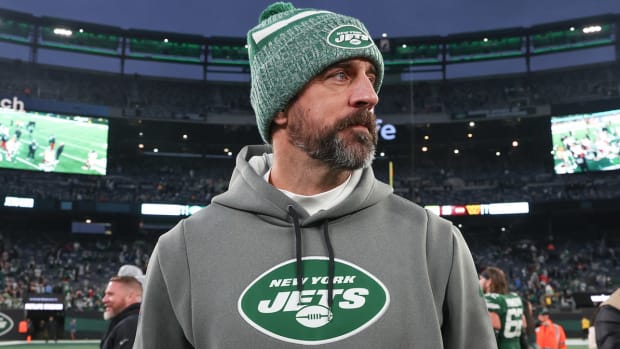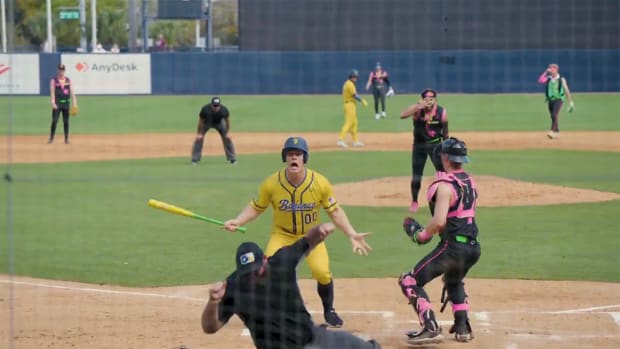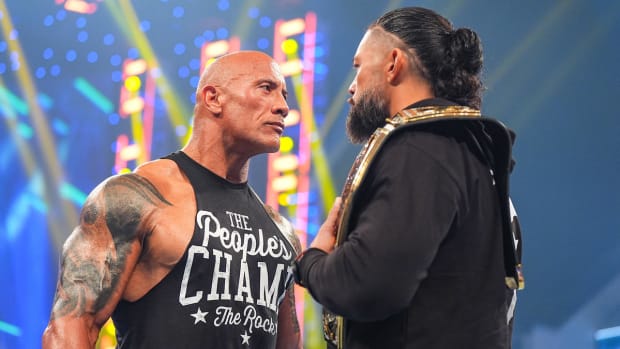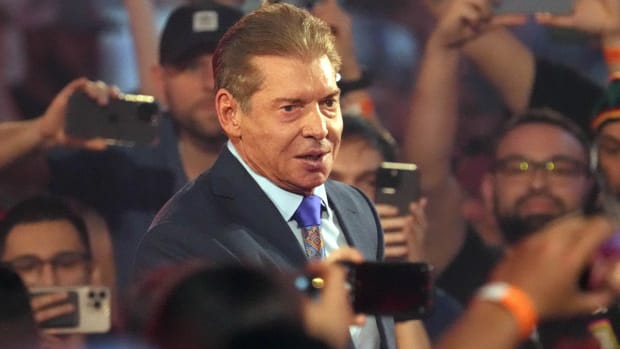Kane Q&A: How The Undertaker Helped Kane Find Longevity in WWE
The fourth installment of WWE’s Last Ride documentary airs this Sunday on the WWE Network, offering a deeper look at The Undertaker. And very few know the man behind the character quite like Glenn Jacobs.
Despite immense size and a talent in the ring, Jacobs languished early on in WWE, struggling to find the right character. That all changed in 1997 when he donned the red-and-black mask of Kane, becoming The Undertaker’s younger brother and forever carving himself into wrestling lore. He made his debut at the end of the first-ever Hell in a Cell match at the Badd Blood pay per view, and 23 years later, with multiple plot twists and a signification evolution of the character, Kane continues to be part of the WWE lexicon.
Now the mayor of Knox County, Tenn., Jacobs remains close with Mark Calaway, better known as The Undertaker. The two first formed a friendship in 1996 during the period when Jacobs was working as Isaac Yankem, DDS, and Calaway shared some advice with a frustrated Jacobs after a forgettable match. Jacobs used Calaway’s words for motivation, and their friendship continued to strengthen over the next two-plus decades.
Jacobs spoke with Sports Illustrated about Kane’s debut, finding career longevity with the character and the impact of The Undertaker.
Justin Barrasso: By the time you debuted as Kane, you had already worked as Isaac Yankem and the fake Diesel, so you were certainly no stranger to WWE. How were you pitched this new character of Kane?
Glenn Jacobs: Undertaker needed an opponent for an upcoming pay per view. I was working in USWA at the time for Jerry Lawler, and I can’t remember if it was Bruce Prichard or Jim Cornette who called me, but I was told to stand by. I got another call later that week and I was told Vince really liked this idea and it wasn’t going to be a one-off, that it’s was going to be a storyline. From there, we were off to the races.
The original name of the character was Inferno. I didn’t like that very much. I though it sounded cartoonish. Bruce Prichard always liked the name Kane, and I liked it, too. It played off Cain and Abel in the Bible, the good brother and the bad brother, and we pitched that. The name got changed, we finally figured out the outfit, and then I had my debut at the [Badd Blood] pay per view.
I was really excited. I felt I wasn’t going to be successful in my other characters, but this was one where, if I couldn’t be successful as Kane working against The Undertaker, then that was on me. This was my big break, the one everyone dreams about.
Barrasso: Bruce Prichard mentioned to me once that he insisted on the difference in spelling, from Cain to Kane, because he didn’t want to give the Bible too much credit.
Jacobs: Maybe they couldn’t copyright it [laughs].
Barrasso: We normally don’t picture you as intimidated or overwhelmed, but before that Badd Blood pay per view, your future is in your hands. Perhaps it helped that you were wearing a mask, literally masking your nerves, but what was the scene like before your debut?
Jacobs: I was scared to death. It’s not only Undertaker in the ring, but also Shawn Michaels, two top guys. This is also the first time a Hell in a Cell match had ever been done. We walked to the ring earlier in the day—myself, Vince, Bruce Prichard, Jim Cornette and Mark—and we talked about how we wanted it to go down. I didn’t really say much, I listened.
Mark was the one who came up with the idea of throwing my hands up and igniting the ring posts. As The Undertaker, Mark would bring his hands up to bring light to the arena. Kane was supposed to be the opposite of The Undertaker, so everything The Undertaker would do, Kane should do the opposite. That’s how we came up with the idea for pyro.
I was cool by that point, but as I started watching their match, that’s when I saw it was a classic and I stood a really good chance at spoiling this awesome match. I was really nervous about it. Luckily, like you said, I had a mask on and you couldn’t see my face. But there was a pretty high heart rate and a lot of heavy breathing, believe me.
Barrasso: That debut was incredible, from your entrance to the ring to ripping the door off the cage. To this day, when you think of Kane, you automatically think of The Undertaker. But early on, I also think of Mankind and Paul Bearer, who both played important roles in the character’s development. How important were Mick and Paul?
Jacobs: Enormously important. Paul was the guy who bridged The Undertaker and Kane. Months before Kane ever debuted, Paul Bearer was the one planting the seeds in people’s minds. Then the focus shifts to Undertaker versus Shawn Michaels in the first-ever Hell in a Cell, so people forgot about Kane. Then the plot came full circle that particular night.
WWE is a team. It takes an effort to build a character. So how do you elevate this new character that is largely unknown to the level of The Undertaker? How do you do that without diminishing The Undertaker? Mick Foley was a big part of the rivalry. Another person who helped was Vader, who was willing to let me elevate myself to get to a different level. They were very important in getting Kane to the level the character needed to be.
Barrasso: You’d had a big pay per view match before, as Isaac Yankem against Bret Hart at SummerSlam 1995, but working so closely with The Undertaker also meant working closely with Vince McMahon. What was that experience like for you in 1997 and ’98?
Jacobs: Taker did most of the talking [laughing]. He and Vince have a very good relationship. And you have to remember this is during the ‘Monday Night Wars’ when Ted Turner and WCW were hiring so many talents away from WWE. Undertaker was the guy that carried the banner for WWE through those years, and those were lean years. When I first came in, business wasn’t good. Taker stuck with Vince, and Vince hasn’t forgot it.
Barrasso: Kane made his WrestleMania debut at WrestleMania 14. Unlike most of the monsters placed in programs with The Undertaker, you had a WrestleMania rematch with him six years later at WrestleMania XX in Madison Square Garden. Ultimately, the character provided the longevity you were seeking in pro wrestling.
In terms of showing off some personality, that was difficult in the early incarnations of Kane. But your Tombstone piledriver on Pete Rose, who was mocking the crowd in Boston at WrestleMania 14, really endeared you to the WWE audience, even though you were a heel. That was such a pivotal moment for you, but how did it come together?
Jacobs: I actually don’t know whose idea it was. I assume it was Vince’s. I didn’t know anything about it until that day.
It was funny, Paul Bearer’s argument was, "Wait. Kane is the heel. This is going to turn him babyface before his match with The Undertaker." But we were pretty sure the crowd would still look at Undertaker as the good guy and Kane as the bad guy. It was one of those deals where it was a moment of levity and added to the entertainment value.
Barrasso: Longevity in wrestling and sustaining greatness over time is incredibly hard to do. You were able to do accomplish that in large part to your work with The Undertaker, but you also had success away from him, too, which made it even more meaningful when you would eventually work against each other or team together.
The Brothers of Destruction will live on in wrestling lore, but was there a particular moment when you two bonded off-screen?
Jacobs: It happened before I became Kane. We had a match when I was Isaac Yankem, D.D.S. and it was horrible. It was all my fault, and it was a terrible match.
I was having a lot of trouble. I wasn’t happy and it showed. Mark pulled me aside after the match and basically said, "Look dude, Vince likes you. I like you. But unless you get your butt in gear, you’re going to be out of here. You belong here, now starting act like it." That lit a fire under me, and it’s probably the most important moment of my wrestling career.
Barrasso: The Kane character has had so much success over a number of different iterations, and two that particularly resonate are your work with The Undertaker, of course, as well as your time teaming with Daniel Bryan.
Taker and Bryan have much different personalities, but you are closely aligned with both of them. Is Bryan sort of the adopted Brother of Destruction?
Jacobs: Man, I hope not. Daniel Bryan is the most annoying person on this planet, and I don’t think The Undertaker would tolerate it [laughing].
Barrasso: I know they’re very different, but are there any similarities between Taker and Bryan?
Jacobs: A lot, actually. They’re both very passionate about what they do, and they’re both very dedicated. Each, in his own way, has been able to take the gifts they have been given and utilize those, maybe more so than anyone else ever has.
In Mark’s case, it’s his size and his athleticism. Daniel’s the opposite. He’s obviously a great athlete, but he’s been able to take that underdog approach, being a smaller guy, and make the absolute most of that. They’re kind of mirror opposites, but in the end, they’re the same—they are both consummate professionals who always do the best they can.
Barrasso: When you think of his career, is there one moment that stands out in your mind?
Jacobs: I remember a night when we were backstage in Chicago. This is back when Austin was champion, and me and Undertaker, we beat him at the same time to become co-champions [at In Your House in September of 1998]. That blew up, so at the next month’s pay per view, it was Kane vs. The Undertaker, with Austin as the special guest referee.
I remember Mark’s hips and back were really bothering him. After the match, I saw him collapse on the stairs and get right back up. You would have never known he was in so much pain during the match. Another night in Houston, Texas, which is Mark’s hometown, and he had some of his family there. We’re having a match and he’d broken his ankle a few days before at TV. I don’t think we knew his ankle was broken at this point, and we’re trying to have this match but he can barely move, so I’m trying to move around him. Despite the fact that he was in a lot of pain, he tried to get me as over as he possibly could.
I’ve seen that happen on a number of occasions, even when Mark couldn’t perform at the level he wanted. But in his heart, he was out there doing everything he could. The Undertaker always gave everything he had, and that’s the epitome of Mark Calaway as a performer.
Justin Barrasso can be reached at JBarrasso@gmail.com. Follow him on Twitter @JustinBarrasso.






